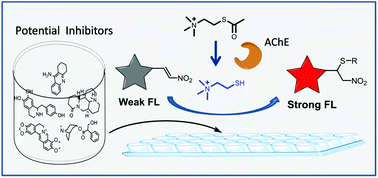A new fluorescent probe for sensing of biothiols and screening of acetylcholinesterase inhibitors†
Abstract
A new N2O-type BODIPY probe (LF-Bop) has been proposed for the selective and sensitive detection of biologically relevant small molecular thiols. This detection is based on the Michael addition reaction between the thiol and nitrostyrene groups in the probe, which decreases the quenching effect from the nitro group, thus resulting in the recovery of the deep-red fluorescence from the BODIPY structure. The results show that LF-Bop is able to detect all tested free thiols through a fluorescence turn-on assay. The lowest limit of detection (LOD) for glutathione was found to be down to nanomolar levels (220 nM). Based on this probe, we have developed a new fluorescence assay for the screening of acetylcholinesterase inhibitors. In total, 11 natural and synthetic alkaloids have been evaluated. Both experimental measurements and theoretical molecular docking results reveal that both natural berberine and its synthetic derivative dihydroberberine are potential inhibitors of acetylcholinesterase.



 Please wait while we load your content...
Please wait while we load your content...